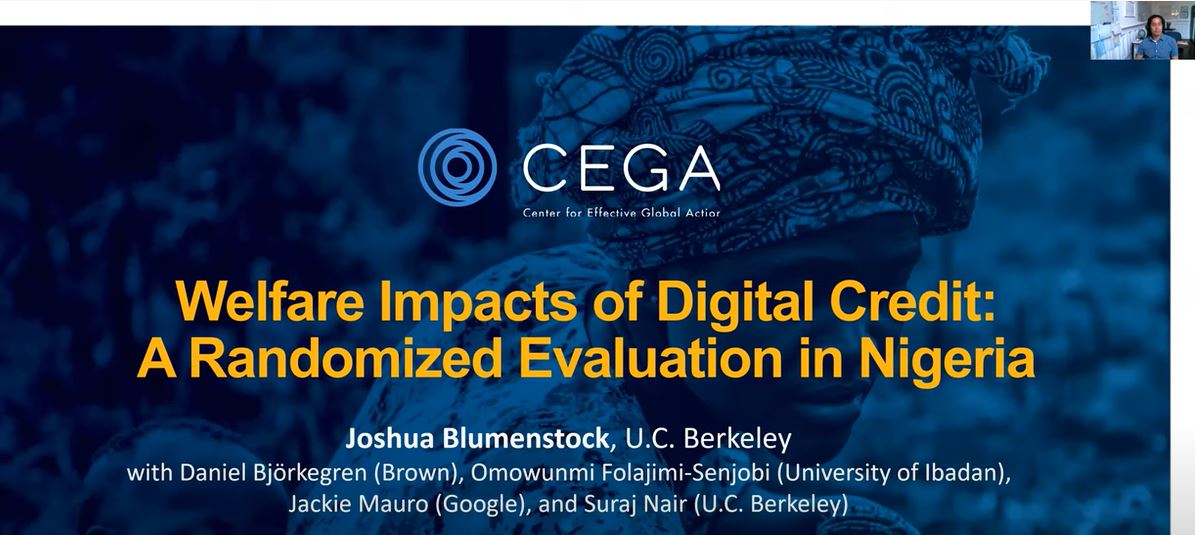Welfare-centric Credit Scoring in Nigeria

Young girls using their mobile phone in rural Makurdi, Benue state | Credit: Stars Foundation
Context
While financial service providers have traditionally employed loan officers to decide who can borrow and how much given anticipated repayment rates, digital credit products make lending decisions automatically using algorithms. Algorithmic credit scoring lowers the costs of lending and provides an opportunity to inspect and re-optimize lending decisions to achieve objectives beyond repayment. However, the impacts of digital credit access and loan size remain understudied. Additionally, while there is optimism around the potential for digital financial services to benefit women and other financially excluded populations, borrowers tend to be higher-educated and predominantly male, and it is an open question whether the impacts of digital credit differ for women borrowers.
Study Design
In Nigeria, the research team worked with an app-based fintech lender to rigorously evaluate the impacts of a digital credit product on clients. A two-stage randomized evaluation allowed researchers to study the effects of both whether a customer was offered credit and how much credit they were offered. Among a representative subset of new customers applying for their first loan, the research team first randomly assigned half for automatic loan approval irrespective of their credit score, and the other half to Branch’s standard approval process. Second, they randomize the initial loan size so that some customers are offered larger loan offers than they would have otherwise received, ranging from NGN 947 (USD$2.50) to NGN 3788 (USD$10). Borrowers that successfully repay are allowed to apply for progressively larger loans up to a maximum of NGN 200,000 (USD$528). Monthly interest rates for the product range over the one month loan period from 1.5 – 20% (equivalent to an APR of 18 – 260%), and while on-time payment is required to apply for future loans, there are no other penalties for default. Researchers conducted phone surveys with 1,618 borrowers three months after their initial loan application in order to measure the impacts on clients’ borrowing behavior and well-being. This included measures of consumer financial welfare, ability to cope with shocks, women’s empowerment, and mental health outcomes; and investigation of whether these impacts differ by borrower gender.
Results and Policy Lessons
Perhaps unsurprisingly, results show that the intervention increased access to formal credit and led to a (small, but significant) decrease in the use of informal loans from friends, family, or moneylenders. Among approved loan applicants, 85% chose to take out a loan, and among these borrowers 23% default on a loan. Those that repay subsequently apply for larger loans, climbing the proverbial ‘loan ladder;’ borrowers accessed an average of USD$56 in loans over the three-month period.
The researchers found that increased access to digital loans improves subjective well-being to a similar degree as impacts measured from other consumer credit products. This evaluation rules out large short-term impacts — both positive and negative — on borrowers’ income and expenditures, resilience, and women’s economic empowerment. While these results can not speak to longer-term impacts, this evidence is encouraging given concerns about consumer protection. For more details, see the resources in the section below.
Researchers are using these results in ongoing work to illustrate how new data and algorithms can better balance benefits to borrowers as well as financial institutions’ profits. Using the welfare metrics collected from respondents to evaluate impacts, the research team leverages recent advances in machine learning – which make it possible to predict who will benefit from a decision and how– to design “welfare-centric” credit scores. This theoretical work of designing and testing the algorithms will allow the research team to better understand how lending decisions can balance the predicted (i) economic welfare benefits, (ii) women’s empowerment, and (iii) lender profits. They will then test this approach in real-world digital credit settings, using only the information available on borrowers at the time of loan applications to inform real-world customer-centric credit-scoring.


